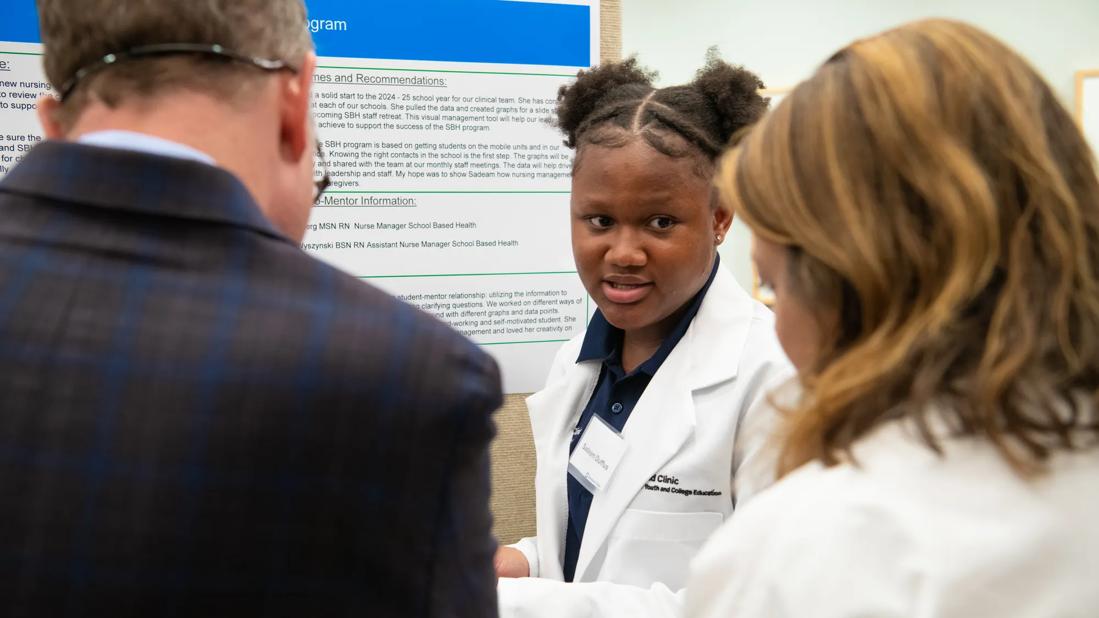Clinical mentors and job rotations provide a view of opportunities

Image content: This image is available to view online.
View image online (https://assets.clevelandclinic.org/transform/8f3f48c7-b51b-45e6-8691-85dd0ef5f5c4/student-poster-presentation)
Student presenting poster during internship
The path to a medical career was well established for Cleveland Clinic OB/GYN physician Lauren Bouchard, MD.
Advertisement
Cleveland Clinic is a non-profit academic medical center. Advertising on our site helps support our mission. We do not endorse non-Cleveland Clinic products or services. Policy
“I've been exposed to healthcare professions from an early age. My dad was a pediatrician,” says Dr. Bouchard. “We would go on rounds with him when we were little girls and sit at the nursing station when we were just little kiddos. I also did a summer internship when I was in college. I worked in a pathology lab and I was a courier for the lab specimens, which exposed me to different subspecialties and helped inform my decision about what specialty I chose eventually.”
Dr. Bouchard’s team worked with Cleveland Clinic’s Center for Youth and College Education (CYCE), which offers a variety of ways for young people to learn more about healthcare careers. Together, they established an OB/GYN summer internship program.
“We were especially interested in connecting with students in and around the city of Cleveland who may not otherwise be exposed to careers in medicine,” Dr. Bouchard says. “But the opportunity was open to everyone.”
Applicants had to be 16 or older, have a 2.5 grade point average or higher and be a U.S. citizen. Five students were hired for the six-week paid internship. Each student was assigned two mentors – physicians, medical assistants or certified nurse midwives — who helped them learn about a labor and delivery, surgery, community health, high-risk obstetrics, and administration.
Students also collaborated on quality improvement and research projects, and presented posters at the end of their internships.
“They weren’t directly involved with clinical care, but they observed what it’s like to work within OB/GYN, and they were able to help with patient transportation and grabbing snacks and water for patients,” Dr. Bouchard says.
Advertisement
The biggest challenge in setting up the program was recruitment and coordinating day-to-day schedules, she says. “There are so many moving parts when it comes to coordinating with caregivers around their days off and post-call days. We wanted to make sure that the students had a connection with somebody who truly was committed to their education and making sure that they had a good experience,” she says.
The program received positive feedback from students.
“One student saw a vaginal delivery with one of the midwives and was just blown away by how miraculous that was,” says Dr. Bouchard. “She came in thinking that she would be an OB/GYN, but ultimately wanted to switch to pre-nursing and become a midwife. She mentioned how hands-on, caring and compassionate the midwives were in really being there for the patient in both an emotional and physical way.”
The program also has elicited wider interest from clinicians in being mentors. The hope is to expand the program during the next internship cycle, she says.
“A lot of us feel like this type of work, especially mentoring high school students, kind of fills your cup because they're so excited and impressionable and they're very new to the medical field,” says Dr. Bouchard. “Their enthusiasm can be infectious.”
Advertisement
Advertisement
Interdisciplinary program fosters high-performance teams
1:1 guidance benefits individuals and organization
Strategies for building connections, staying present
Development leader harnesses shared purpose to fuel meaningful giving
Expert tips from Cleveland Clinic’s Chief Legal Officer
Dedicated leader shares her passion for quality, education and professional development
Groups move the metrics in environmental services and sterile processing
Certified coaches help hospital teams build trust, improve communication